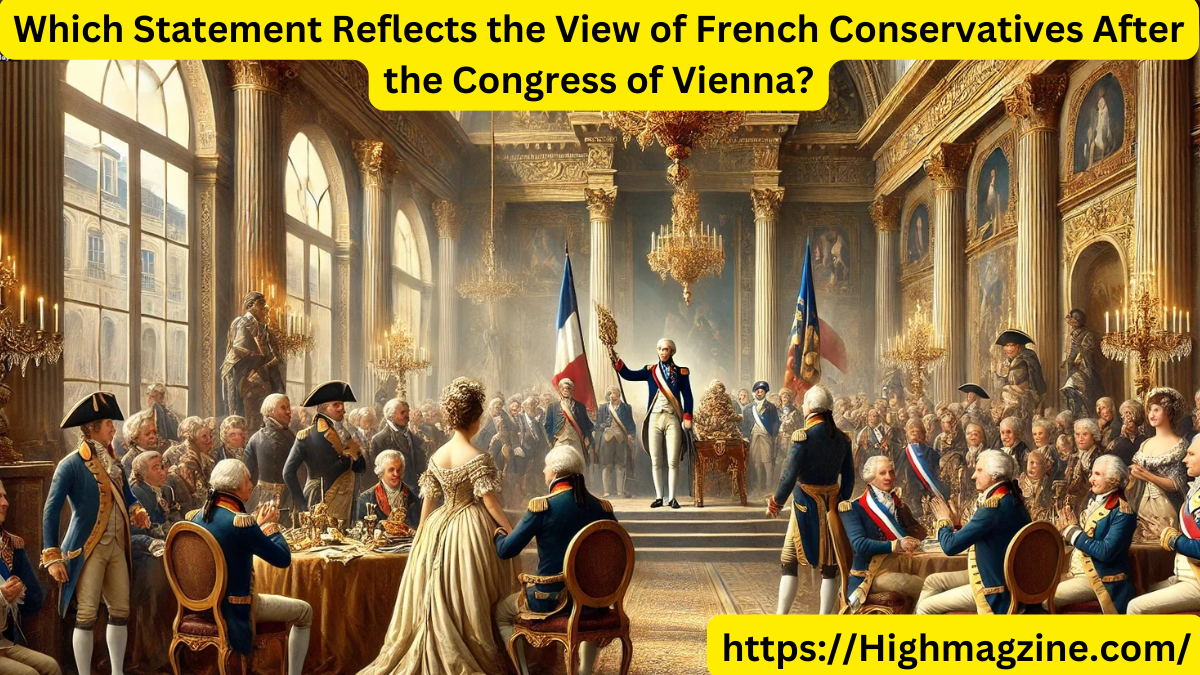Understanding the Context of the Congress of Vienna
The Congress of Vienna, held between 1814 and 1815, was one of the most important diplomatic gatherings in European history. Its primary goal was to restore stability and order to Europe after the chaos caused by the Napoleonic Wars. Delegates from all major European powers, including Austria, Russia, Britain, Prussia, and France, convened to redraw the continent’s political map. France, although defeated, was treated relatively leniently to maintain balance and prevent future conflicts. However, the Congress also had far-reaching impacts within each participating nation, particularly France, where political factions held differing Which Statement Reflects the View of French Conservatives After the Congress of Vienna? opinions about the changes brought about by the Congress.
French conservatives, emerging stronger after the fall of Napoleon, sought a return to traditional authority and social hierarchy. They viewed the revolutionary period and Napoleonic rule as dangerous deviations from a more stable and moral past. Their perspectives were deeply rooted in a desire to undo the revolutionary changes and reestablish a monarchic and hierarchical society that, in their view, had maintained France’s glory and stability before 1789.
The Ideological Foundations of French Conservatism
French conservatives after the Congress of Vienna believed firmly in the restoration of legitimate monarchies and the traditional social order. They saw the monarchy as a symbol of unity, tradition, and divine will. In their eyes, the chaos and bloodshed of the French Revolution proved the dangers of abandoning hierarchical rule in favor of popular sovereignty and liberal ideals. The conservatives argued that strong monarchical governance, supported by an aristocracy and the Church, was essential to preserve social harmony and prevent future revolutions.
In this ideological climate, the reinstatement of the Bourbon monarchy under King Louis XVIII was viewed not merely as a political necessity but as a moral obligation. Conservatives believed that the Revolution had torn apart the natural fabric of society and that it was the duty of the post-Napoleonic leaders to mend it by restoring time-honored traditions. The French Charter of 1814, issued by Louis XVIII, was a constitutional document that attempted to balance old regime principles with some revolutionary gains, but conservatives largely hoped for a stronger emphasis on absolute royal authority and fewer concessions to liberal or revolutionary ideals.
The Conservative Vision for France After Vienna
In trying to answer which statement reflects the view of French conservatives after the Congress of Vienna, the clearest would be: “They supported the restoration of the monarchy and the reestablishment of traditional social hierarchies.” This statement captures the essence of French conservative thought during this period. Conservatives were deeply committed to undoing the political and societal changes wrought by the Revolution and Napoleonic era. They favored the reinstatement of privileges for the nobility, the reestablishment of the Catholic Church’s prominent role in public life, and the reduction of revolutionary ideas about equality and democratic governance.
French conservatives were wary of the growing influence of liberalism and nationalism that spread across Europe in the wake of the Revolution. They believed that stability could only be achieved through a return to pre-revolutionary structures, where monarchs ruled by divine right, and societal classes were clearly defined and respected. The Congress of Vienna, which emphasized the principle of legitimacy — the idea that legitimate monarchs deposed by Napoleon should be restored — aligned perfectly with their vision for France and Europe as a whole.
The Role of the Bourbon Restoration
The Bourbon Restoration was a period during which French conservatives tried to put their ideals into practice. With Louis XVIII on the throne, they saw an opportunity to restore many elements of the old regime. However, they faced a France that had been dramatically transformed by twenty-five years of revolution and war. Land redistribution during the Revolution meant that many peasants owned land for the first time, and these gains could not simply be reversed without sparking widespread unrest.
Nevertheless, conservatives worked to roll back as many revolutionary reforms as possible. They reestablished the influence of the Church, reinstated aristocratic privileges where feasible, and sought to suppress political dissent and revolutionary movements. The White Terror, a period of political violence directed against former revolutionaries and Bonapartists, reflected the intense desire among conservative elements to exact retribution and restore the old social order.
Yet the Bourbon monarchy had to navigate a delicate balance between conservative demands and the realities of a changed France. While Louis XVIII acknowledged the need for some reforms to placate the broader populace, the more ultra-royalist elements of society remained frustrated, believing that the monarchy was too liberal and compromised.
The Conservative Backlash Against Liberalism
French conservatives after the Congress of Vienna were not merely concerned with restoring the monarchy; they were deeply suspicious of any form of liberal thought. They associated liberalism with the upheavals of the Revolution — the beheading of the king, the Reign of Terror, and the wars that had ravaged Europe. Conservatives argued that liberal ideas about democracy, individual rights, and secularism were fundamentally incompatible with the natural order of society.
The conservative response was to advocate for censorship of the press, strict control over education, and surveillance of political dissidents. They supported policies that reinforced the power of the monarchy, the Church, and the aristocracy, believing that only through such measures could France be safeguarded from future instability.
At the same time, conservatives were part of a broader European movement that sought to suppress revolutionary and nationalist movements wherever they appeared. The Holy Alliance between Russia, Austria, and Prussia, while less relevant to France directly, shared the conservative goal of maintaining monarchic authority and preventing the spread of liberal ideas.
Long-Term Impact of French Conservative Views
The conservative dominance in France following the Congress of Vienna shaped French politics for decades, but it did not eliminate the forces of change unleashed by the Revolution. Tensions between conservative and liberal elements continued to simmer throughout the Restoration period. The Revolution of 1830, which deposed Charles X, a strongly conservative Bourbon king, and replaced him with the more liberal Louis-Philippe, the “Citizen King,” demonstrated the limits of conservative efforts to turn back the clock entirely.
Still, the conservative desire to restore traditional authority left a lasting mark. Their efforts influenced the structure of the French state, the role of the Catholic Church, and the relationship between the monarchy and the people. Even as France moved toward more liberal political arrangements over time, conservative values about order, tradition, Which Statement Reflects the View of French Conservatives After the Congress of Vienna? and hierarchy remained powerful undercurrents in French society.
In a broader European context, the conservative vision espoused by French monarchists after the Congress of Vienna contributed to a century of political tension between old regime forces and the advocates of liberalism and nationalism. These tensions eventually culminated in the revolutions of 1848, which swept across Europe and challenged the conservative order established in Vienna.
Conclusion
In summary, the statement that best reflects the view of French conservatives after the Congress of Vienna is that they supported the restoration of the monarchy and the reestablishment of traditional social hierarchies. Driven by a desire to undo the perceived chaos of the revolutionary period and Napoleonic rule, French conservatives sought to restore a France based on monarchy, aristocracy, and the Church. Their influence was profound during the Bourbon Restoration and left an enduring legacy on French political and social structures. However, despite their efforts, the revolutionary ideals of liberty, equality, and fraternity could not be entirely extinguished, setting the stage for continued struggles between tradition and change throughout the 19th century.






